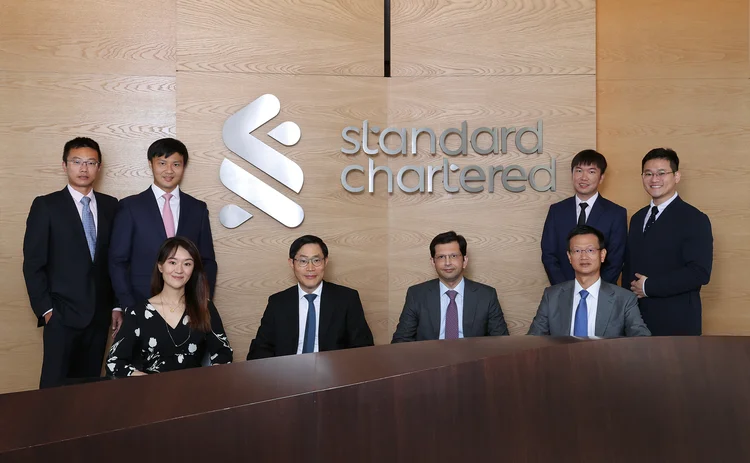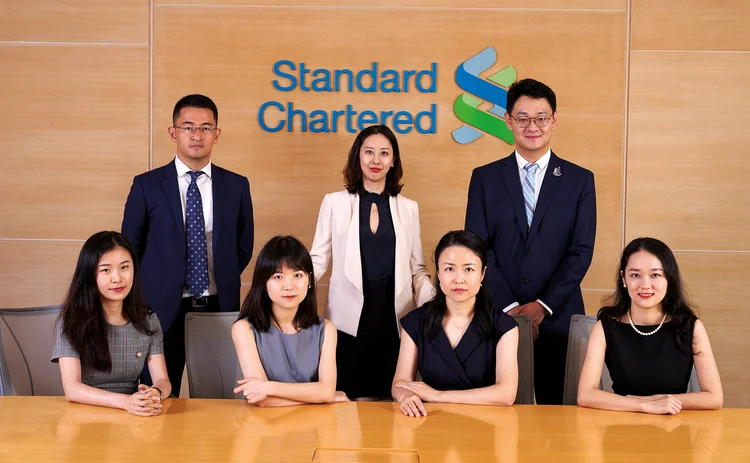
RMB house of the year: Standard Chartered
Asia Risk Awards 2022

Standard Chartered has continued to prove its leading role in bridging markets and facilitating capital flows into and from China with its innovative RMB-based solutions and swift reaction to the country’s regulatory reforms.
The UK bank has been known for its long and wide presence in China and around the globe, a deep understanding of the Chinese markets and regulations, as well as memberships to a wide range of cross-border routes. Having set foot in China more than 160 years ago, Standard Chartered now offers 24-hour client coverage for RMB products with its unique trading team around the world, led by a New York-based senior trader with strong China expertise.
This has equipped the bank to capitalise on an evolving post-Covid market environment, in which US dollar interest rate hikes and the Russian invasion of Ukraine have put higher importance on RMB in international trade and financial activities.
The heightened use of RMB in a cross-border context is also in line with Chinese policy-makers’ drives to boost the currency’s internationalisation. Over the past 12 months, regulators have introduced more relaxations, including the launch last September of the Southbound Bond Connect scheme, which enables Chinese mainland investors to access the offshore China market in Hong Kong and the opening up of more capital market products.
Chinese corporates and financial institutions have thus embarked on their RMB redenomination strategies by increasing their usage of the currency outside China in support of underlying commercial activities. Eyeing the trend, Standard Chartered used its deep knowledge of the market and regulations, as well as its strong structuring and trading capabilities, to provide its clients with pioneering financing and hedging solutions.
“We are well-positioned to embrace regulatory and market changes with our clients, and to develop innovative RMB solutions that best serve the full spectrum of our clients’ needs,” says Charles Feng, head of macro trading for Greater China and north Asia at Standard Chartered.
CNH boom
As US Federal Reserve rate hikes push up dollar funding costs and China’s property woes lead to investors avoiding the debt of the country’s high-yield issuers, dollar bond sales have plunged, while offshore RMB bonds have grown. The RMB borrowing costs are more attractive for issuers than US dollar rates, while for investors, the notes often offer better yields than onshore RMB debt.
“We are seeing more and more domestic financial institution investors looking at macro- and global-based strategies for yield enhancements,” says Feng.
“In the past, onshore investors were comfortable with the too-big-to-fail assumption in China. But since that assumption has been broken, especially in the past 18 months, investors are getting a wake-up call, diversifying into major international banks’ CNH credit papers that often come with better credits and risk reward,” says Feng.
Non-Chinese financial firms have dominated the issuance of dim sum notes this year, and Standard Chartered rode the wave, printing the largest CNH multi-callable issuances by any international banks.

The result came from a major financial institution in China with a large investment plan for diversified RMB debt instruments. With the onshore CNY curve dropping, the company was looking to achieve yield enhancement to compensate for the low return of the onshore bond market.
Standard Chartered quickly prepared a tailor-made issuance of callable CNH notes, taking advantage of the market opportunity on the USD/CNH swaps market. The notes issued by Standard Chartered UK enjoyed the high credit rating of the issuer, married to a callable feature to achieve yield enhancement without additional risk on the coupon rate or principal. The bank’s global presence also allowed its trading team to recycle the risk to western clients.
The bank made two seven-year callable issuances for a notional equivalent of over $440 million, marking the largest CNH senior unsecured multi-callable issuances on a single day by an international bank.
“The investor is buying a relatively simple CNH fixed rate callable bond,” says Henry Hung, executive director of macro trading, based in Hong Kong.
“Our key strengths come from our global trading capability, timely distribution of such large CNH interest rate risk by often matching client needs on the opposite side, including those from the US/European time zones, and the risk management ability to provide yield enhancement by monetising the CNH swaptions well.”
Product pioneer
The wider credit spread on offshore bond market compared with the onshore CNY capital market has also prompted Standard Chartered to create a new solution, entering a credit risk mitigation risk agreement (CRMA) with its clients, China’s top-tier security houses as protection sellers. The transaction was a market first, referencing offshore USD and CNH bonds, and cleared at Shanghai Clearing House.
While CRMA-wrapped instruments have not been actively used in the onshore market because of the lack of market depth, the first successful execution has given onshore investors the confidence to use these derivatives instruments to gain exposure to offshore bonds and achieve substantial yields.
“This onshore CRMA, from a regulatory perspective, is a very helpful product because, with the Southbound Bond Connect, the product allows investors onshore to help support the offshore credit market when there is a big disconnect,” says Feng.
“These transactions can help onshore market players in their investment return and risk management, and also improve the efficiency and integration of the two bond markets, ultimately lowering the cost of funds to corporates that depend on them in borrowing.”
Standard Chartered has been an early participant in the northbound leg of the bond connect and is among around a dozen market makers in the new southbound leg launched last September.
This onshore CRMA, from a regulatory perspective, is a very helpful product because, with the Southbound Bond Connect, the product allows investors onshore to help support the offshore credit market when there is a big disconnect
Charles Feng, Standard Chartered
Another major regulatory development came in May, when China’s State Administration of Foreign Exchange announced the opening up of Asian options and its combinations referencing the foreign exchange rate against onshore RMB – a product norm for corporate clients to hedge their FX exposure in the West, but not in China until now.
Standard Chartered worked with corporate clients in different regions to execute Asian-style options and forwards, products that offer smooth payouts based on the average fixing of FX rates over a period.
The average fixing feature allows a client to avoid fixing risk that would adversely affect the hedging efficiency of European options and vanilla forwards if the FX market were under amplified move against the client at expiry. In addition, Asian options are offered at a discount premium compared with European options.
“From the regulatory announcement to our first trade, it was about 20 days in total,” says Celine Luo, executive director of structuring based in Shanghai.
“This shows our speed to the market and how we are able to leverage our strength as an international bank. Asian options have not been a new thing for G10 products, so we already have that capability.”
Standard Chartered also demonstrated a strong engagement with the Chinese regulator on authorised FX product types involving RMB currency pairs in the Free Trade Unit. Over the past year, it has quickly established a full range of FX structured hedging solutions dedicated to FTU clients, and closed several deals that helped clients risk-manage based on their cashflow projection and risk appetite.
“We are seeing more onshore clients engaging hedging activities in the FTUs. For example, with the greater flexibility to access the CNH cross-currency swaps market, clients can take advantage of the elevated CCS level to achieve a significant saving in foreign currency borrowing,” says Joanna Jin, executive director of macro trading based in Shanghai.
Ibor transition
This year also marks an important milestone for the Libor transition, as many markets, including China and Hong Kong, stopped using Libor as the interest rate benchmark, and started to use risk-free rates in new deals. Standard Chartered was well-prepared for the switch by engaging with its clients in the most up-to-date products referencing the new rates such as the secured overnight financing rate (SOFR).
“Libor was widely used in different products. What has become very important is how quickly and effectively you are able to use the new SOFR index in erstwhile products that were referencing Libor, which is not just interest rate swaps and cross-currency swaps, but also structured investment products,” says Mansoor Ahmad, regional head of structuring for Greater China and north Asia at the bank.
“While the change in legal documentation is simple, the risk management of a product based on [an] overnight index is different from [a] term index.”
The bank was quick to make the index change on structured deposits – a popular wrapper that offers investors payouts linked to an underlying market observable index. Corporate clients frequently invest unused RMB short-term liquidity in capital guaranteed structured deposits.
Launched in the first quarter of this year, the bank has completed over RMB500 million ($70.1 million) term deposits on range accrual linked to SOFR.
“We developed an RMB structured deposit offering with range accrual payoff linked to the SOFR index. We have helped clients become familiar and understand the risks of [risk-free rate] indices through an early and ongoing engagement [with] Ibor transition,” says Ahmad.
Only users who have a paid subscription or are part of a corporate subscription are able to print or copy content.
To access these options, along with all other subscription benefits, please contact info@risk.net or view our subscription options here: http://subscriptions.risk.net/subscribe
You are currently unable to print this content. Please contact info@risk.net to find out more.
You are currently unable to copy this content. Please contact info@risk.net to find out more.
Copyright Infopro Digital Limited. All rights reserved.
As outlined in our terms and conditions, https://www.infopro-digital.com/terms-and-conditions/subscriptions/ (point 2.4), printing is limited to a single copy.
If you would like to purchase additional rights please email info@risk.net
Copyright Infopro Digital Limited. All rights reserved.
You may share this content using our article tools. As outlined in our terms and conditions, https://www.infopro-digital.com/terms-and-conditions/subscriptions/ (clause 2.4), an Authorised User may only make one copy of the materials for their own personal use. You must also comply with the restrictions in clause 2.5.
If you would like to purchase additional rights please email info@risk.net
More on Awards
Market data provider of the year: S&P Global Market Intelligence
S&P Global Market Intelligence has consistently met demands across Apac’s fast‑evolving capital markets, securing its win at the Risk Asia Awards 2025
Best user interface innovation: J.P. Morgan
J.P. Morgan wins Best user interface innovation thanks to its Beta One portfolio solution
Market liquidity risk product of the year: Bloomberg
Bringing clarity and defensibility to liquidity risk in a fragmented fixed income market
FRTB (SA) product of the year: Bloomberg
A globally consistent and reliable regulatory standardised approach for FRTB
Best use of cloud: ActiveViam
Redefining high-performance risk analytics in the cloud
Best use of machine learning/AI: ActiveViam
Bringing machine intelligence to real-time risk analytics
Collateral management and optimisation product of the year: CloudMargin
Delivering the modern blueprint for enterprise collateral resilience
Flow market-maker of the year: Citadel Securities
Risk Awards 2026: No financing; no long-dated swaps? “No distractions,” says Esposito







